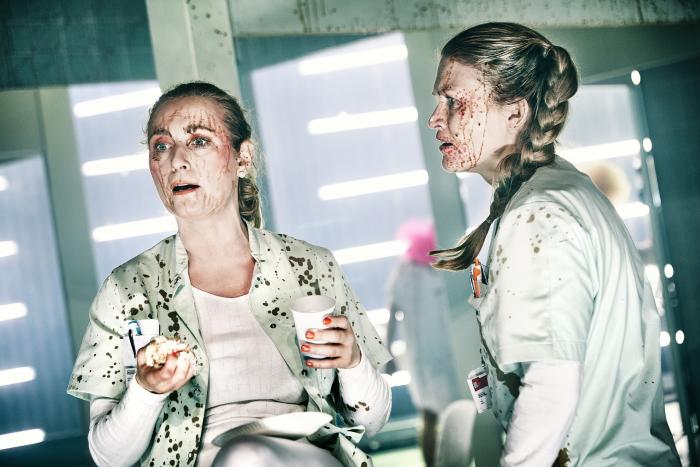Tragedy without guilt? A genre based approach to analysing performance affect in The Hospital
Læs artiklen her: https://tidsskrift.dk/peripeti/article/view/121366

Forfattere
- Josefine Brink Siem
Nøgleord:
Affect theory, Genre, Performance analysis, Christian Lollike, Eric Bentley, Tragedy
Resumé
The 2018 performance The Hospital uses a combination of a tragic narrative structure and grotesque slapstick and splatter to portray a nightmarish version of budget cuts and managerial reforms in the Danish public healthcare system. In this article, I focus on the affective dimensions of its bifurcal dramaturgy, and asks how it relates to the diagnosis of the efficiency dispositive in public management. I argue for an analytical approach that observes the entire performance as a ‘being of sensation’ (Deleuze and Guattari 1994) with its own affective logic, thereby switching analytical orientation from affective spectatorship to affective dramaturgy. I use genre analysis as a way to account for the performance’s way of becoming a body in terms of two interrelated affective dynamics: blocs of sensation and modes of relation. By employing Eric Bentley’s genre criticism as a semantic for describing the Hospital’s blocs and modes, I identify a double affective dramaturgy of tragic guilt and farcical aggression and schadenfreude, where open-ended aggression ultimately becomes the dominant bloc of sensation. Through a comparative gesture to the performance Living Dead, which unifies its narrative and affective elements in a horror aesthetic performing blocs of fear, I show how an affect-sensitive concept of genre can observe the relation between signifying and non-signifying elements as determined by a performance’s specific dramaturgy rather than by any a priori analytical distinctions.
Forfatterbiografi
Josefine Brink Siem
Josefine Brink Siem is PhD-fellow at the department of Dramaturgy and Musicology at Aarhus University, Denmark. Her PhD-project is focused on developing and qualifying concepts for analysing the affective dramaturgies of artworks in theatre, on television and on social media.
Referencer
Aristotle, 1996. Poetics (M. Heath, Trans.). London: Penguin.
Barba, Eugenio, 2010. On directing and dramaturgy: burning the house. London: Routledge.
Bentley, Eric, 1991. The Life of the Drama. New York: First Applause Printing.
Deleuze, Gilles, & Guattari, Felix, 1994. What Is Philosophy? New York: Columbia University Press.
Dolan, Jill, 2005. Utopia in Performance. Ann Arbour: University of Michigan Press.
Eriksson, Birgit, 2017. Dissolving Europe?: fear of refugees and ourselves in Christian Lollike’s Living Dead. Akademisk kvarter online, Vol. 16. DOI: 10.5278/OJS.AK.V0I16.2608
Farrell, Charlotte, 2012. Barrie Kosky’s The lost echo: rethinking tragic cartharsis through affective emergenc(e)y. Peripeti, Nr. 17 (pp. 67-76).
Fensham, Rachel, 2009. To watch theatre: essays on genre and corporeality. Bruxelles: P.I.E. Peter Lang.
Fensham, Rachel, 2016. Affective Spectatorship: Watching Theatre and the Study of Affect. In K. P. e. a. Christel Stalpaert (Ed.), Unfolding Spectatorship: shifting political, ethical and intermedial positions (pp. 39-60). Gent: Academia Press.
Fischer-Lichte, Erika, 2010. Ästhetik des Performativen. Frankfurt: Suhrkamp.
Hancock, Ange-Marie, 2004. The politics of disgust: the public identity of the welfare queen. New York: New York University Press.
Kierkegaard, Søren, 1987. Either/Or part I. Princeton: Princeton University Press
Kristeva, Julia, 1982. Powers of horror: an essay on abjection. New York: Columbia University Press.
Lehmann, Hans-Thies, 2005. Postdramatisches Theater, Frankfurt: Verlag der Autoren.
Marks, Laura U., 2000. The skin of the film: intercultural cinema, embodiment, and the senses. Durham: Duke University Press.
Massumi, Brian, 2002. Parables for the virtual: movement, affect, sensation. Durham: Duke University Press.
Ó Maoilearca, Laura Cull, 2012. Theatres of Immanence. London: Palgrave Macmillan.
Pavis, Pavis, 2003. Analyzing performance: theater, dance, and film. Ann Arbor: University of Michigan Press.
Pavis, Pavis, 2016. Watching the Spectator: New Perspectives on Spectatorship. In K. P. e. a. Christel Stalpaert (Ed.), Unfolding Spectatorship: shifting political, ethical and intermedial positions (pp. 23-38). Gent: Academia Press.
Reason, Mathew, 2016. Affect and Experience. In M. Reason and A. M. Lindelof (Ed.), Experiencing Liveness in Contemporary Performance (pp. 83-96). London: Routledge
Sauter, Wilmar, 2000. The theatrical event: dynamics of performance and perception. Iowa City: University of Iowa Press.
Sedgwick, Eve K., 2003. Touching feeling: affect, pedagogy, performativity. Durham: Duke University Press.
Sobchack, Vivian, 1992. The address of the eye: a phenomenology of film experience. Princeton: Princeton University Press.
